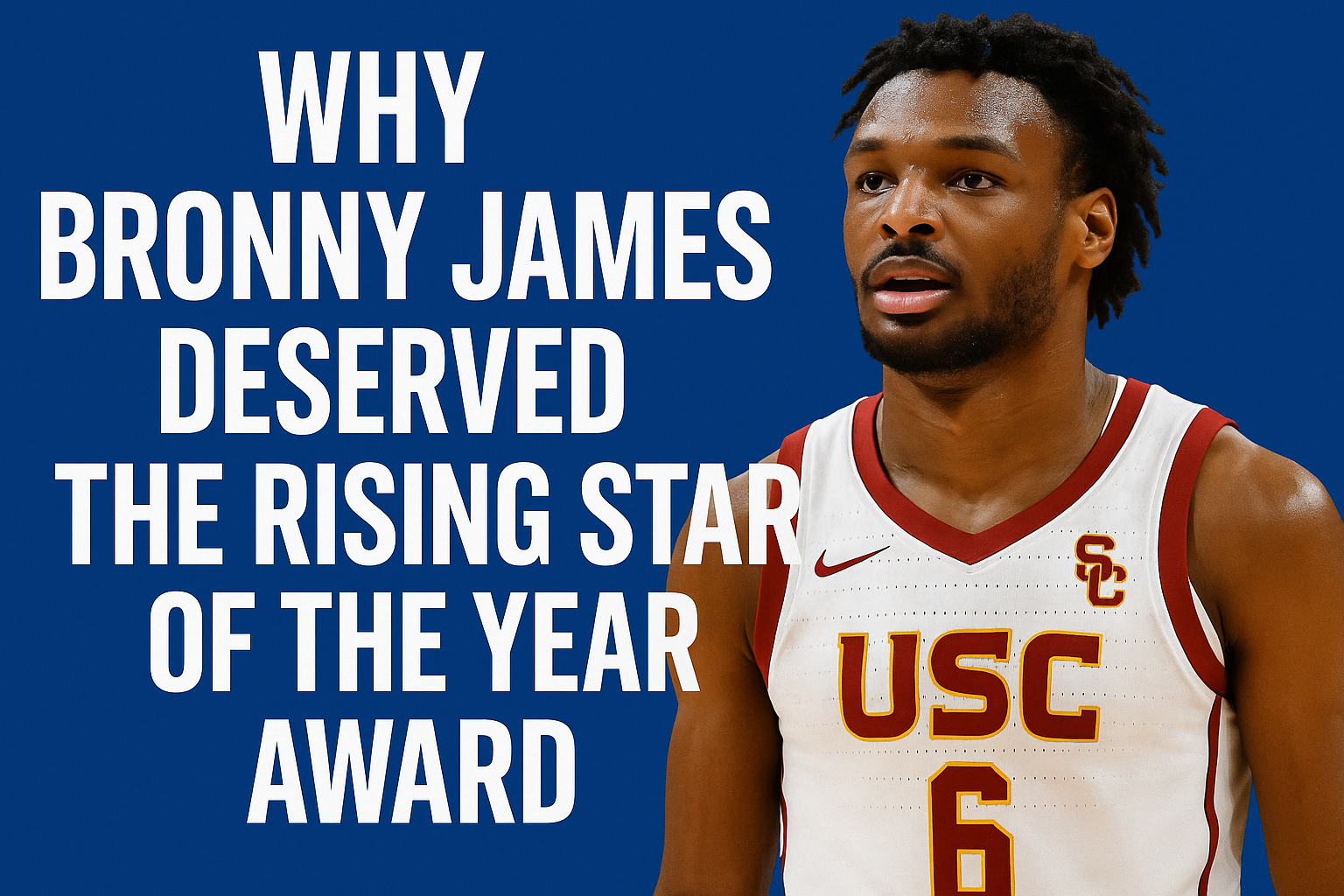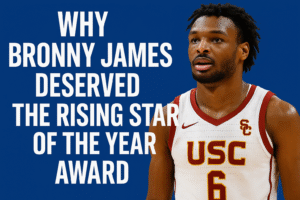
A Deeper Look at His Impact and Potential
In a season packed with compelling storylines, standout debuts, and emerging talent across college basketball, the race for “Rising Star of the Year” was as competitive as it’s ever been. While the eventual winner may have had the numbers and narrative that made them a safe choice, there’s a growing case—both statistical and emotional—that Bronny James should have claimed that title. His journey through adversity, his undeniable growth, and the cultural weight he carries within the sport all make him a standout in ways that go beyond the box score.
Let’s be clear: the “Rising Star of the Year” award isn’t just about numbers. It’s about potential realized. It’s about trajectory. And more than anything, it’s about who made the biggest leap—whether in skill, maturity, leadership, or visibility—over the course of the season. In that light, Bronny James was not just a contender; he was the most complete symbol of what it means to rise.
The Comeback That Started It All
To understand Bronny’s season, you have to start with how it began—not with a highlight reel, but with a moment that shook the basketball world to its core.
In July 2023, Bronny James collapsed during a workout due to a sudden cardiac arrest. It wasn’t just a medical emergency; it was a national moment of fear, reflection, and concern. Questions swirled about his future in basketball. Would he play again? Should he play again? And more importantly—could he come back and thrive?
Less than five months later, Bronny was back on the court for USC. Not just in uniform, but competing at the highest level of college basketball in the Pac-12. That return, in and of itself, was a triumph. It was a testament to his determination, his work ethic, and the support system around him. In a sport where durability and resilience are everything, Bronny passed his toughest test before the season even really began.
And when he returned, he did more than just show up. He got better—fast.
On-Court Contributions: A Story of Steady Growth
While Bronny’s averages might not jump off the page at first glance, they require context. He joined a USC roster already filled with established veterans and was thrust into the season late, having missed crucial preseason development and early chemistry-building games. Despite this, he adjusted remarkably well.
His role evolved throughout the season, going from limited minutes to critical defensive assignments, offensive facilitation, and leadership duties. His basketball IQ—something scouts and coaches consistently praise—allowed him to catch up to game speed quicker than most expected. His ability to make the right play, defend multiple positions, and maintain composure in tight situations became evident with every outing.
One area where Bronny truly shined was on defense. He consistently guarded the opposing team’s top backcourt threat, using his lateral quickness, strength, and awareness to make stops that didn’t always show up in the stat sheet. He may not have led USC in points, but his impact on the flow of the game was undeniable.
By the season’s midpoint, Bronny wasn’t just catching up—he was making an argument for more minutes and responsibility. And he earned them. Few freshmen, especially those overcoming a major medical scare, showed the same kind of improvement curve Bronny did. It wasn’t just development—it was evolution in real time.
The Weight of a Name: Pressure Few Understand
It’s impossible to talk about Bronny James without acknowledging the shadow he lives under—the shadow of his father, LeBron James, one of the greatest basketball players of all time. For some, that name opens doors. For Bronny, it has often meant a microscope few athletes his age have ever experienced.
Every move, every stat line, every missed shot is dissected through the lens of comparison. Critics are quick to point out where Bronny doesn’t match his father’s trajectory, while often overlooking the entirely different player he is—and is becoming. But through it all, Bronny has carried himself with poise. He doesn’t chase headlines or highlight clips. He puts his head down, works, and plays within the system.
The mental strength required to navigate that kind of pressure—especially after a life-threatening health scare—cannot be overstated. Bronny hasn’t just risen as an athlete; he’s matured in front of our eyes. That kind of grace under fire is exactly what the Rising Star award is meant to celebrate.

Cultural Impact and Role Model Status
Beyond stats and tape, Bronny James is a cultural force. His presence in college basketball brought new viewers to the game, reignited interest in USC’s program, and further blurred the lines between NCAA basketball and the NBA’s next generation. For better or worse, the attention he draws brings eyeballs to the sport—and he handles that responsibility with humility.
He’s already a role model to a generation of young athletes who see in him a unique combination of discipline, dignity, and drive. Whether through his play, his interviews, or his actions off the court, Bronny embodies the values that the award should honor: rising not just in fame, but in integrity.
The Bigger Picture: Awards Should Reflect More Than Stats
In many ways, Bronny’s season forces us to ask a bigger question: What do we want to reward in college sports? Is it just numbers? Or is it the story—the context—the intangible progress that reveals something deeper?
Bronny James didn’t put up All-American stats in his first year. But he did what many deemed impossible. He came back from a near-death experience, embraced his role on a competitive team, developed new facets of his game, and became a leader by example. He didn’t take shortcuts. He didn’t lean on his name. He earned every minute, every possession, every applause.
That’s rising. That’s stardom. That’s what the award should represent.
Looking Ahead: The Star Is Still Ascending
As Bronny prepares for the next phase—whether it’s returning to college ball or making the leap to the NBA—there’s no question that his best basketball is still ahead of him. Scouts continue to rave about his defensive upside, his passing instincts, and his potential as a two-way guard in the modern game. He’s already drawing comparisons to NBA-level role players who carved out long careers through effort and intelligence—players like Jrue Holiday, Marcus Smart, and Derrick White.
More importantly, Bronny is shaping a new narrative—one where resilience and character are valued as much as scoring titles. And that’s a legacy that will last far beyond any award.
Conclusion: A Missed Opportunity for the Right Message
The “Rising Star of the Year” award is about more than who scored the most or had the flashiest highlight. It’s about who rose above expectations, who took the biggest step forward, and who represented the spirit of progress in college basketball.
By those standards, Bronny James should have been the obvious choice.
His season was a triumph not just of recovery, but of reinvention. He turned a moment of tragedy into a year of growth, maturity, and inspiration. He played with purpose. He carried himself with class. And he reminded us all why sports matter—because they reveal the strength of the human spirit.
The committee may have passed him over, but history won’t. Bronny James has already earned something far more enduring than a trophy—he’s earned the respect of everyone who understands just how far he’s come.
And that, more than anything, makes him the true rising star.
Leave a Reply